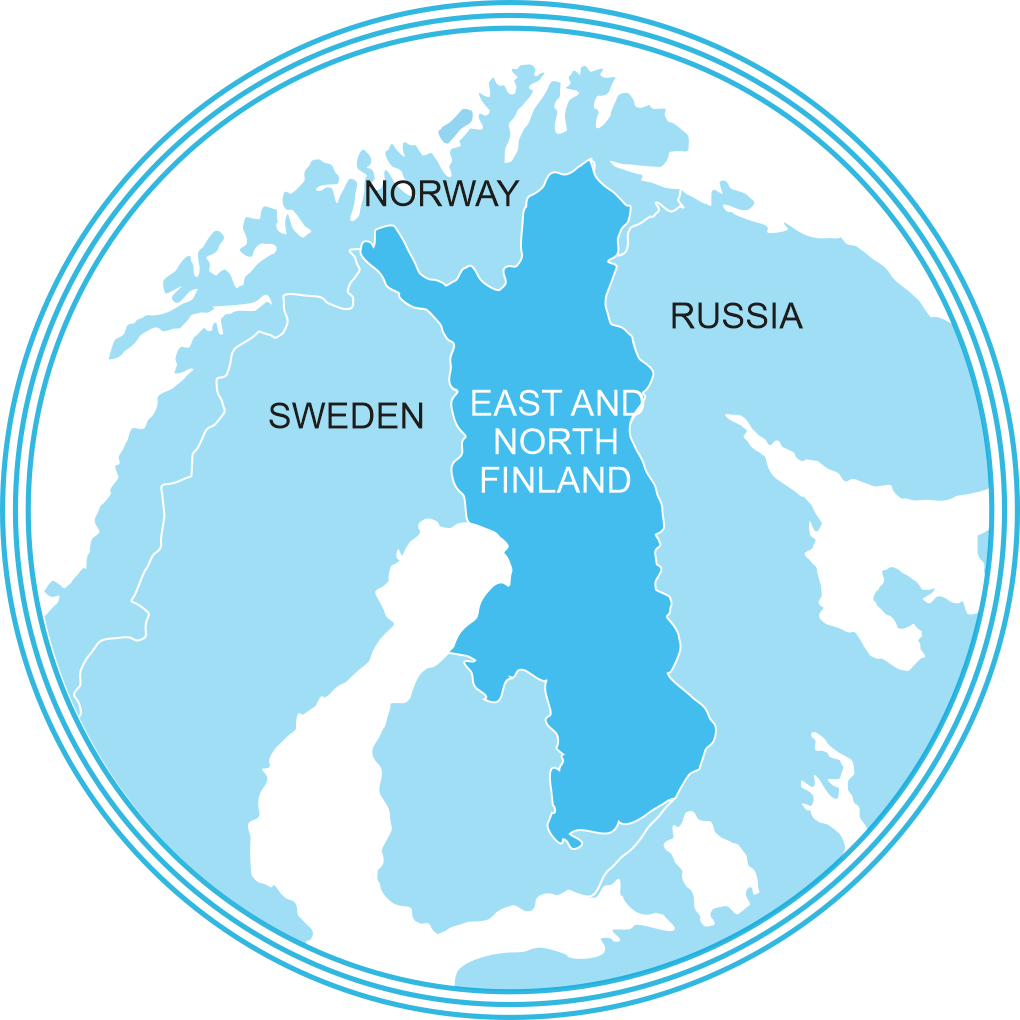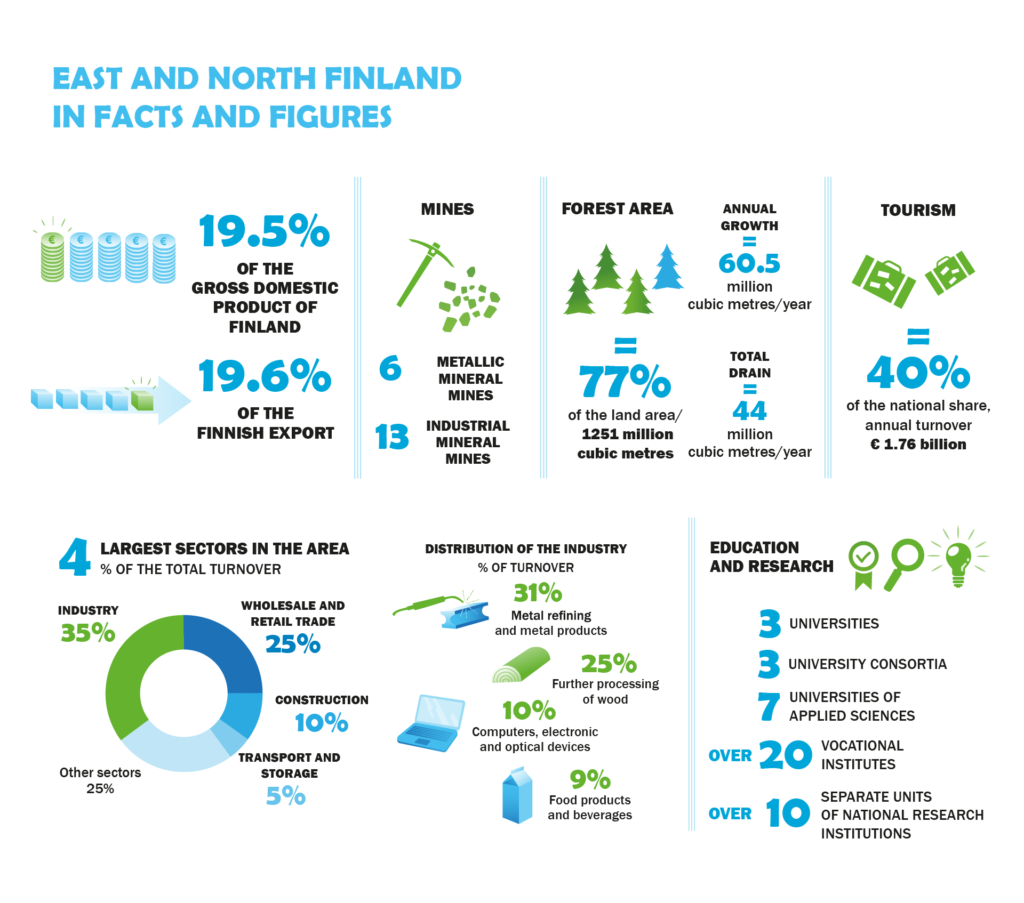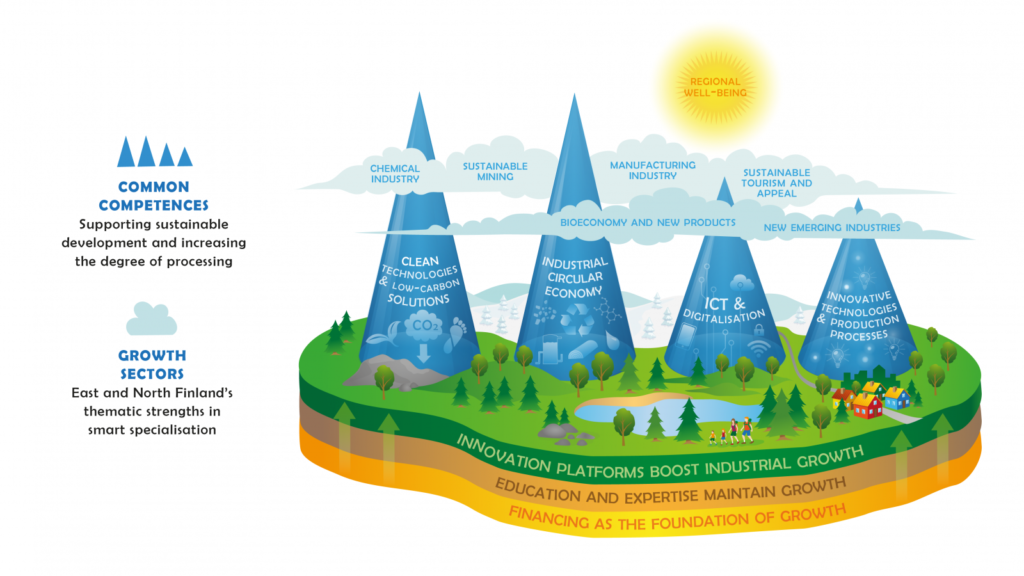East and North Finland relies on its strenghts
The sustainable refining of natural resources and conditions is one of the backbones of ENF economy, both now and in the future. The significance of natural resources in the Nordic areas has been emphasised in the EU in the past few years. At the same time, the regions´s unique nature attracts tourists from around the world. Whether we are looking at production activities or the development of services, increasing the value added is the common denominator and the general foundation for the creation of sustainable operating methods. This perception is highlighted in the smart specialisation strategies of the ENF regions. The regions have invested in the development of a versatile economic structure, and at the same time searched for distinct smart specialisation choices to boost the regional competitiveness.


The East and North Finland in Industrial Transition – smart specialisation strategy 2019-2023 is based on a pilot project “Regions in Industrial Transition” launched by the European Commission in 2017. All seven regions in the ENF area took part in the pilot with the aim to strenghten the co-operation of the ENF area, both across regional borders and internationally. The purpose of the piloting was to develop new procedures based on smart specialisation to support the industries, growth and employment in the ENF area.
The regions of East and North Finland are working together to build an attractive operating environment where companies can work and grow. The strategy aims at strengthening the co-operation of the ENF area and promoting growth and internationalisation of enterprises. The strategy is based on common priorities that have been collected from the smart specialisation strategies of the ENF regions. The identified common growth sectors in the East and North Finland are bioeconomy and new products, sustainable mining, chemical industry, manufacturing industry, sustainable tourism and appeal and new emerging industries.
Strategic objective
Strenghtening the regenerative capacity of industries and promoting the growth and internationalisation of enterprises.
Operating plan
Helping business in ENF to develop by strengthening collaboration in the building of value chains, introducing new financing models, promoting growth and investing in joint communications and marketing.

Common priorities support sustainable development
During the strategy process, cross-cutting competences were identified that form a base for the common development priorities in the implementation of the strategy. The ENF regions possess speacialised expertise, technology and business activities associated with these themes. Furthermore, they create the best possible foundation for ENF collaboration that uses the existing top-level expertise to develop industries.
PRIORITY I: CLEAN TECHNOLOGIES AND LOW-CARBON SOLUTIONS are cross-cutting themes in the business. The industries valued by the ENF regions are built on the management and maintenance of development and the sustainable use of natural resources and conditions. The regions have become centers of expertise and environmental business that offer customised competence and technological solutions for environmental challenges, energy issues and sustainable use of natural resources.
PRIORITY II: INDUSTRIAL CIRCULAR ECONOMY forms a strong, mutually complementary competence in the entire ENF area. The utilisation of industrial side streams has created a new, rapidly growing business sector. The systematic development of efficient solutions and practises has turned several regions into nationally and even internationally respected experts. To become even stronger and more competent specialists, these regions need measures that support sustainable development. It is crucial to ensure that natural resources are used in a sustainable and resourse-efficient manner in the ENF area. Developing methods for water treatment promotes the implementation of a circular economy. Circular economy has become profiled around developing the business opportunities of major industrial companies and their service operators.
PRIORITY III: DIGITALISATION, INNOVATIVE TECHNOLOGIES AND PRODUCTION PROCESSES are key factors in enhancing the competitiveness of enterprises. Utilising the high-tech competence found in the area creates new opportunities for both service providers and end users. All industries must undertake a renewal process. Digitalisation and new technologies will have a significant role in this reform. Businesses that utilise digital solutions grow and become internationalised at a quicker pace than others. At the national level, only 8 % of SMEs utilise digital solutions, and in ENF the figure is as low as 2-3 %. Innovative technologies and production processes can be used to boost the existing production and use of raw materials, thus increasing profitability.